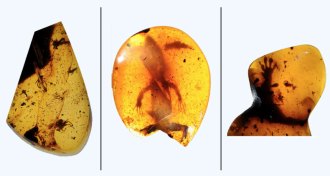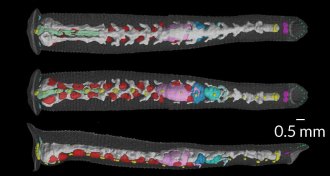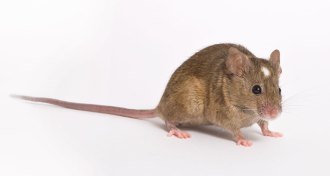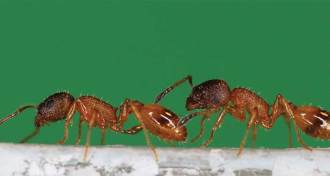Life
Sign up for our newsletter
We summarize the week's scientific breakthroughs every Thursday.
-
 Paleontology
PaleontologyLizards locked in amber provide clues to reptile evolution
Amber-encased lizard remains that date to 99 million years ago may shed light on the evolution of geckos and chameleons.
-
 Animals
AnimalsIs Amy Tan actually ‘thrilled’ a leech is named after her?
Novelist Amy Tan answers a lingering question about celebrities honored in scientific names of new species — her namesake is a leech.
By Susan Milius -
 Genetics
GeneticsMissing genes not always a problem for people
Humans have ways to make up for missing genes, study suggests.
-
 Animals
AnimalsHow killing wolves to protect livestock may backfire
Lone wolves are more likely to prey on goats and other livestock than are wolves living in packs, a new study finds.
-
 Paleontology
PaleontologyFossil reveals an ancient arthropod’s nervous system
A roughly 520-million-year-old fossil preserved an ancient arthropod’s ventral nerve cord and peripheral nerves.
-
 Oceans
OceansMagnetism from underwater power cables doesn’t deter sea life
High-voltage power cables that ferry electricity across the seafloor do not negatively impact local fish and crabs, new studies show.
-
 Oceans
OceansProtected coral reefs may not be the ones that need protection
A new study finds that more than half of the world’s coral reefs site within a half-hour of a human settlement. But those that are protected tend to be far away.
-

-
 Animals
AnimalsTiger protection in Thailand produces results
Despite good efforts, the goal of doubling the global tiger population by 2022 looks impossible.
-
 Earth
EarthReaders respond to blue tarantulas, multiparticles and white outs
Readers respond to the January 9, 2016 issue of Science News with thoughts on blue tarantulas, multiparticles, and avalanches.
-
 Genetics
Genetics‘Selfish’ DNA flouts rules of inheritance
R2d2 is selfish DNA that could skew scientists’ views of adaptation and evolution.
-
 Animals
AnimalsRock ant decisions swayed by six-legged social media
When rock ants start influencing each other with one-on-one social contact, a colony’s collective decisions can change.
By Susan Milius